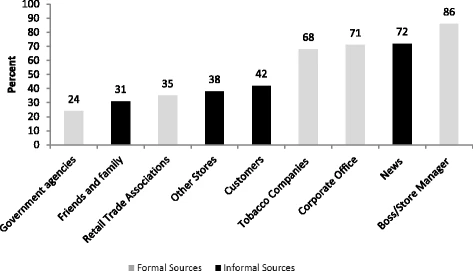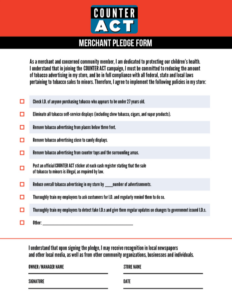Merchant Education
Tobacco control policies sometimes feature complex requirements or undergo changes that may not be well publicized. On top of this, localities occasionally implement policies that are more stringent than the state or federal laws. Point-of-sale policies depend on retailers’ understanding and compliance with the law in order to be effective. Merchant education is another component of an effective strategy to reduce youth access to tobacco and ultimately lessen the burden of tobacco-related death and disease in our communities.[1] In some cases, violations occur – and penalties are imposed – not because of intentional misconduct but because of a lack of understanding on the part of an individual, property owner, or business. Merchant education programs help to ensure that retailers are able and motivated to comply with the law. Education and outreach are labor- and resource-intensive, and communities will vary in their ability to implement such efforts. An effective education and outreach program can simultaneously improve compliance, benefit community relations, and promote buy-in for public health policies.
business. Merchant education programs help to ensure that retailers are able and motivated to comply with the law. Education and outreach are labor- and resource-intensive, and communities will vary in their ability to implement such efforts. An effective education and outreach program can simultaneously improve compliance, benefit community relations, and promote buy-in for public health policies.
Why do merchant education?
Retailers play an important role in keeping harmful products out of the hands of youth. Despite the 2019 federal law prohibiting retailers from selling tobacco products to anyone under the age of 21 (Tobacco 21), underage youth continue to obtain tobacco from retail sources. According to a national survey, over 43% of underage e-cigarette smokers reported obtaining their devices from a tobacco retailer. Vape shops were identified as the primary retail source (22.0%), followed by gas stations/convenience stores (15.9%).[2] These results add to a body of evidence suggesting that retailers are not properly complying with minimum legal sales age laws or the associated age verification processes.[3][4][5] Comprehensive merchant education programs have the opportunity to provide retailers with age verification techniques, such as ways to confirm authentic photographic identification and tips for declining sales to underage buyers.
Merchant education can provide an opportunity to learn about and address any perceived barriers that retailers have to compliance. In a study of North Carolina retailers, over 90% of retailers supported policies that limit youth from purchasing tobacco, including fines for selling to minors and increasing fines for multiple violations. However, these same retailers pointed to a number of barriers that make compliance more difficult. The most frequently cited barrier was that making changes to how tobacco is sold hurts their business (29%). Other commonly perceived barriers included that it was too hard to redo store space/displays (24%), took too much time to make required changes (23%) or was too costly (22%).[6]

Merchant education also provides retailers with a reliable source of information. The previously referenced study of North Carolina retailers also provides insight on the usual source of information about rules and regulations for the retailers that they spoke with. Interestingly, only 24% list governmental agencies as a primary source of information. Meanwhile, 68% list tobacco companies (and 35% list Retail Trade Associations – which are often backed by tobacco companies) as their primary source of information. It is reasonable to assume that information coming from the industry will be focused on assuring the maximum possible presence of tobacco in the store. Boss/store manager is the most common source of information, making it all the more important that management is fully informed about all rules, regulations, and agreements.[6]
What is included in merchant education programs?
According to FDA guidance, an effective merchant education program should include information on the following: (1) applicable laws and penalties, (2) health effects of youth tobacco use, (3) comprehensive descriptions of tobacco products covered by laws prohibiting the sale of tobacco products to youth, (4) age verification techniques, (5) tips for refusing sales, and (6) testing to ensure that employees have required knowledge. The FDA also recommends all employees are trained prior to selling tobacco products, with refresher training provided at least annually and when violations occur.
This FDA webinar provides an overview of the various resources available to retailers that may help prevent the sale of tobacco products to individuals under the age of 21, focusing specifically on age verification, internal compliance checks, and recommended training practices.
States and localities across the country have developed their own educational programs and resources to ensure retailers are aware of and adhering to tobacco control policies. Some programs include free online courses for retailers and others involve conducting regular in-person visits. Often flyers, handouts or signage are provided in multiple languages. In addition to instructions on how to adhere to policy, educators often share information on compliance checks and describe penalties for violations. Sometimes programs also develop materials

such as a script to guide educators in communicating with retailers. States like New Jersey and Virginia include a pledge for retailers to commit to responsible sales practices and other voluntary actions to limit youth exposure to tobacco, such as reducing advertising. In an evaluation of an online merchant education program offered in Canada, participating retailers suggested incorporating ways to motivate employee involvement, such as making the training mandatory, offering the training free of charge, and keeping the training simple.[7]
Pairing merchant education efforts with a comprehensive enforcement program is the most effective way to reduce sale to minor rates.[8] For example, in addition to education classes and in-store training , the Southwest Utah Public Health Department included an underage buy attempt by a trained youth at every retailer four times a year. Eighty six percent of stores participated in retailer education classes. The tobacco buy rate to minors was over 20 percent in 2001. After the program was implemented in 2002, the minor buy rate was reduced to four percent.
Asking retailers to increase their frequency of ID checks is a tangible request that can be made during merchant education visits. A pilot study examining sale to minor violations before and after implementation of New Jersey’s 2017 statewide Tobacco 21 policy provides evidence that more ID checks helps reduce underage sales. In this study, a 19-year-old buyer was recruited to make cigarette and cigar purchase attempts at the same 15 licensed tobacco retailers for five weeks before and ten weeks after the Tobacco 21 effective date in New Jersey. During the attempted buys that took place after the policy’s effective date, 63.3% of retailers still sold tobacco to the buyer. All retailers failed to check ID at least once during each of their 15 visits; however, fewer retailers failed to card the buyer for cigarettes after the policy was in place (81.3% before vs. 69.4% after). In addition, when retailers checked ID, they then sold to minors only 6.7% of the time. Convenience stores had the highest rate of violations (74.5%) compared to other store types. These results show low rates of checking ID and the persistence of underage sales despite the policy change. The underage sales rate in this study stands in contrast to NJ’s low sales to minor rate (13.6%) reported through federally tracked violations during a similar time period. Researchers suggest using a protocol where the same underage youth attempts to purchase multiple times at the same stores in order to more closely mimic real world conditions and produce a truer measure of retailer compliance.[9]
Additional Resources
- To help retailers better understand their responsibilities under the Family Smoking Prevention and Tobacco Control Act (Tobacco Control Act) and comply with the law, the FDA provides a Tobacco Education Resource Library with webinars, training videos, and guidance documents. These resources help to educate retailers and their employees about the Tobacco Control Act and tobacco regulations.


